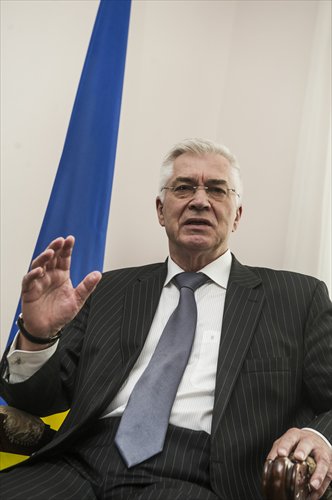HOME >> WORLD
Ukrainian Ambassador: Build an economy open to East and West
Source:Global Times Published: 2014-3-16 14:43:00

Ukrainian Ambassador to China Oleg Dyomin. Photo: Li Hao/GT
Editor's Note: Global Times reporter Li Qian sat down with Ukrainian Ambassador to China Oleg Dyomin to discuss the current situation in Ukraine as Crimea prepares to go to the polls on Sunday in a vote that may dramatically influence the future of the region.
GT: Crimea will hold a referendum on March 16 to decide whether to stay in Ukraine or to join the Russian Federation. If the result is joining Russia, how will Ukraine deal with the situation?
Dyomin: First of all, Crimea is Ukrainian territory. The decision of the Crimean parliament to hold a referendum is against the laws of Ukraine and international law. Therefore, the future result of the referendum is invalid, and Ukraine doesn't recognize it.
GT: Now that Ukraine has a new government which is pro-West and expects to join the EU, how will it handle relations with Russia, with which Ukraine has traditionally maintained close connections?
Dyomin: What I want to say is that Ukraine doesn't have a new government that is closer to Western Europe. The most important task of our new government is to secure the interests of the country and its people, not to get closer to the West. The new government clearly outlined its No.1 mission as tightening cooperation with Russia in various fields, including economic and cultural sectors. Ukraine doesn't aim to develop relations only with the West. Ukraine needs a more open economic system, just like that of China, to boost friendly relations with all parties.
GT: Ukraine is heavily dependent on Russian energy. Just days ago Russia threatened to withdraw its cheaper natural gas prices from Ukraine. How will Ukraine handle the result of its changing relations with Russia?
Dyomin: There are various channels that could be used to relieve Ukraine's reliance on Russia. First of all we can stick to energy conservation and developing new energy. Ukraine has adopted policies and reduced its energy imports from Russia by 40 percent. We may also get energy from other regions like West Europe and Central Asia. We have started cooperation with China, too, to import Chinese technology in the energy sector.
GT: You just mentioned the figure of reducing energy reliance from Russia by 40 percent, compared to when?
Dyomin: It was a calculation based between the years 2012 and 2013.
GT: Ukraine has met with much frustration on its path towards democratization since independence in 1991. What are the obstacles?
Dyomin: The main reason is that Ukraine is young, lacking experience in building a country. The modernization reforms of the economy were too slow and couldn't meet the demands of the time. The traditional markets for Ukrainian products are Russia and the Commonwealth of Independent States (CIS), and they do not have demand for upgraded Ukrainian products, which hindered our economy. In recent years, Ukraine has lacked a market economy and the government was infested with corruption and thus couldn't provide a fair business environment.
GT: Undeniably, Ukraine is now strengthening connections with the EU, and the interim government has announced it will resume the process of signing an association agreement with the EU. Inside the EU, some new members are suffering from policies relating to unions. How does Ukraine view its prospects of joining the EU?
Dyomin: We need to look at the EU, and also to refer to the situation facing countries of the CIS. When Ukraine acquired independence in 1991, our neighbor Poland moved toward Western Europe. At that time, Poland and Ukraine had similar infrastructure and potential, but if we compare the two countries now, we see Poland's gross national product is four times larger than that of Ukraine. Consider the huge potential of Ukraine in agriculture and rich resources in other industries. If the government opens the economy to both the West and East, Ukraine will develop fast. What we need now is to build an economic system open to all, to both East and West.
GT: China and Ukraine have had comprehensive cooperation in many fields. How will Ukraine deal with bilateral relations, and how will it secure ongoing cooperation with China and Chinese enterprises after the recent changes?
Dyomin: The cooperation between Ukraine and China is based on the principle of mutual benefit. We never had disputes in economic or other forms of cooperation. The new government of Ukraine, upon taking power, immediately notified China it would continue all contracts between the two sides.
GT: What adjustments has the embassy made for the imminent situation?
Dyomin: We are busy these days and hold many meetings every day, providing Chinese the true situation in Ukraine and expressing the government's attitudes. Russian media are full of propaganda, so we need to provide true information and reduce the negative impact of it.
Here we want to emphasize that the Ukraine values China's consistent stance on supporting Ukrainian territorial integrity and independence. We hope China, one of the world's leaders and a partner of Russia, will assist with talks between Ukraine and Russia as an intermediary to tackle issues through negotiations. China has been announcing it would support seeking a peaceful solution for the Ukrainian issue. Both Ukraine and China oppose secessionism and extremism. And we believe that our understanding of secessionism is the same. The whole world shares the same recognition of secessionism. The division of Crimea from the Ukrainian government is just like Xinjiang secessionists in China. So, we really hope China supports Ukraine's stance.
Posted in: Diplomatic Channel